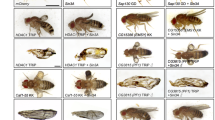Abstract.
We examined the consequences of the deacetylase inhibitor trichostatin A (TSA) on the development of Drosophila melanogaster. When fed to flies, TSA caused lethality and delayed development at concentrations as low as 5 μM, had stronger effects on males than females, and acted synergistically with mutations in the gene encoding the RPD3 deacetylase to cause notched wings, but did not appear to affect a SINA signaling pathway that is normally repressed by the SIN3 corepressor. These findings suggest that deacetylated histones play an important role in normal developmental progression and establish parameters for genetic screens to dissect the role of deacetylases in this process.
Similar content being viewed by others
Author information
Authors and Affiliations
Additional information
Received 14 June 2001; received after revision 31 July 2001; accepted 21 August 2001
Rights and permissions
About this article
Cite this article
Pile, L., Lee, FH. & Wassarman, D. The histone deacetylase inhibitor trichostatin A influences the development of Drosophila melanogaster. CMLS, Cell. Mol. Life Sci. 58, 1715–1718 (2001). https://doi.org/10.1007/PL00000809
Issue Date:
DOI: https://doi.org/10.1007/PL00000809




